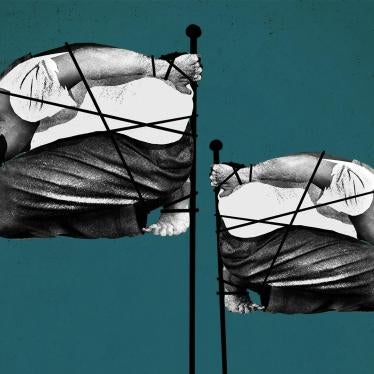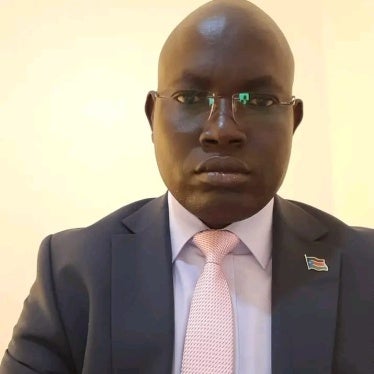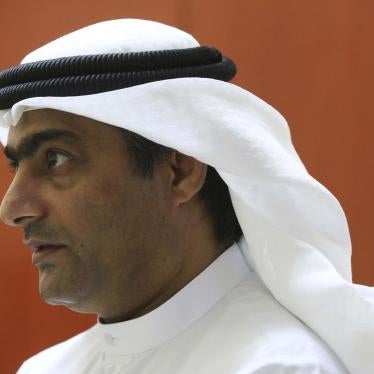(Beirut) – Bulgarian authorities should immediately investigate allegations that police officers assaulted a Saudi human rights activist in their custody, Human Rights Watch said today.
An informed source told Human Rights Watch that law enforcement officers at the Busmanci Migrant Accommodation Center had allegedly assaulted Abdulrahman al-Khalidi, a Saudi rights activist, on March 31, 2024, choking him and beating him in the face and torso. Al-Khalidi, who has spent a decade exposing Saudi rights abuses, had sought asylum in Bulgaria in October 2021. He is at imminent risk of deportation back to Saudi Arabia, where he would be at serious risk of arbitrary detention, torture, and unfair trial.
“After more than a decade of exposing human rights abuses in Saudi Arabia, Abdulrahman al-Khalidi is now himself facing abuse in Bulgaria,” said Joey Shea, Saudi Arabia researcher at Human Rights Watch. “The Bulgarian authorities should conduct a prompt and impartial investigation into the officers’ conduct and hold those responsible for abuses to account.”
The informed source said that the police severely beat al-Khalidi after he attempted to provide food to a fasting family in the detention center on the evening of March 31. After officers apparently prevented him from providing the food, an altercation ensued.
Two policemen hit him hard in the face and in the chest, and another policeman grabbed his hand and pinned him from behind, while the other hit and choked him severely, according to the informed source. The beating lasted an hour, said the informed source.
After the assault, al-Khalidi did not receive medical care or a forensic medical examination, despite his requests, the informed source said. On April 3, Human Rights Watch reviewed an urgent request for a medical examination from al-Khalidi to Bulgaria’s public prosecutor.
Bulgarian authorities should investigate the alleged assault, hold those responsible for any unlawful acts to account, and immediately provide al-Khalidi with medical attention, Human Rights Watch said. In 2013, Human Rights Watch documented poor and overcrowded conditions at the Busmanci Center, as well as beatings and highly abusive treatment by police officers.
In October 2021, al-Khalidi crossed by foot into Bulgaria to claim asylum after living in exile for nearly a decade. The Bulgarian State Agency for Refugees initially rejected his asylum application because they did not recognize al-Khalidi’s risk of persecution, contending that Saudi Arabia had “taken measures to democratize society.”
On February 7, the Bulgarian National Security Agency issued a deportation order for al-Khalidi, placing him at imminent risk of deportation. Al-Khalidi has appealed the decision. The Bulgarian judiciary issued an order for his release on January 18, but Bulgaria’s State Agency for National Security overturned the order.
Given the rampant torture and due process violations in Saudi Arabia’s criminal justice system, Bulgaria would violate the principle of nonrefoulement by deporting a highly visible critic of the Saudi government to Saudi Arabia.
From 2011 to 2013, while al-Khalidi was living in Saudi Arabia, he advocated for the rights of prisoners in support of the Saudi Civil and Political Rights Association, also known as HASM. He participated in multiple demonstrations in support of Saudi detainees in Riyadh. In March 2013, al-Khalidi fled Saudi Arabia out of concern for his safety, first to Egypt, then Qatar, and finally Turkey.
In exile, he continued his activism and worked as an opposition journalist. He was also active in an online Saudi movement established by the late journalist Jamal Khashoggi called the Electronic Bees, which sought to counter pro-Saudi government propaganda campaigns and online troll armies.
In the aftermath of Khashoggi’s murder in 2018 in the Saudi Consulate in Istanbul, al-Khalidi feared for his safety. He did not renew his identity documents, which may have required him to appear in the same consulate where Khashoggi was murdered. On October 23, 2021, he fled yet again and crossed into Bulgaria to claim asylum.
Human Rights Watch has repeatedly criticized rampant abuses in Saudi Arabia’s criminal justice system. These violations of defendants’ rights are so fundamental and systemic that it is hard to reconcile Saudi Arabia’s criminal justice system with the basic principles of the rule of law and international human rights standards.
Saudi Arabia applies its uncodified interpretation of Islamic law as its national law. In the absence of a written penal code or narrowly worded regulations, judges and prosecutors can convict people on a wide range of offenses under broad charges such as “breaking allegiance with the ruler” or “trying to distort the reputation of the kingdom.”
Deporting al-Khalidi may violate Bulgaria’s international obligations, including article 3 of the Convention against Torture and Other Cruel, Inhuman or Degrading Treatment or Punishment, which states that “no State Party shall expel, return (“refouler”) or extradite a person to another State where there are substantial grounds for believing that he would be in danger of being subjected to torture.”
It also may violate article 33 of the Convention Relating to the Status of Refugees, which prohibits the “return of a refugee in any manner whatsoever to the frontiers or territories where his life or freedom would be threatened on account of his race, religion, nationality, membership of a particular social group or political opinion.” Bulgaria is a signatory to both conventions.
“Saudi Arabia’s human rights record remains abysmal, despite the billions of dollars that Mohammed bin Salman, its effective leader, has poured into whitewashing his abuses,” Shea said. “Al-Khalidi is in grave danger of arbitrary detention and torture if Bulgaria forcibly returns him.”








